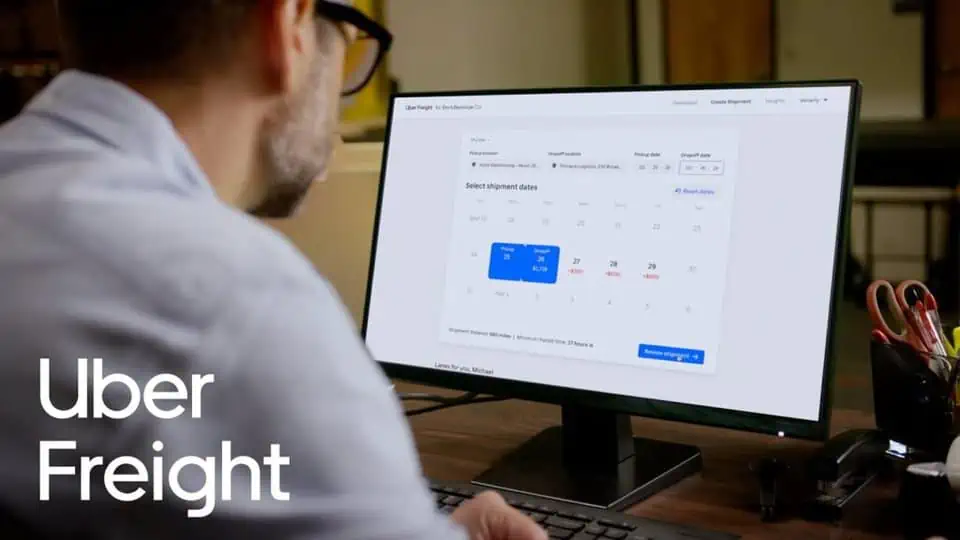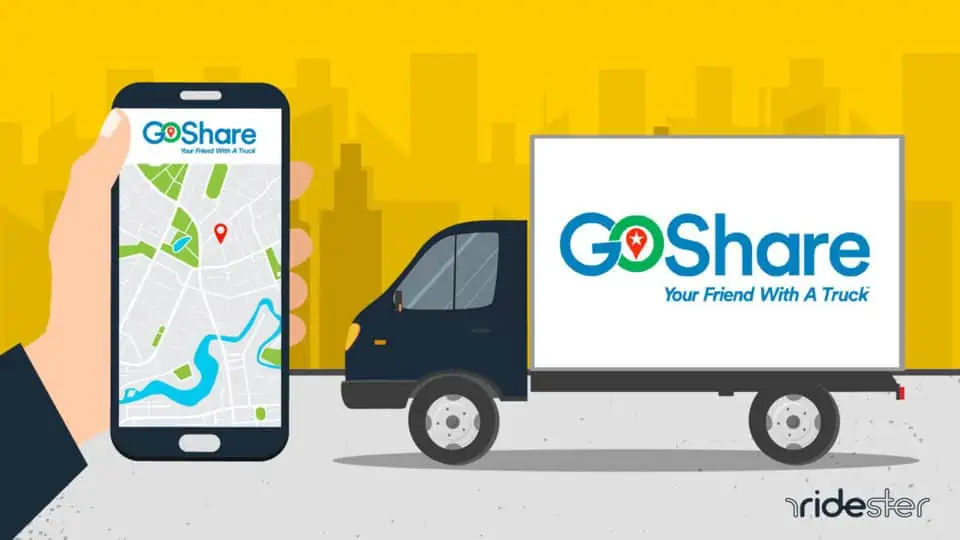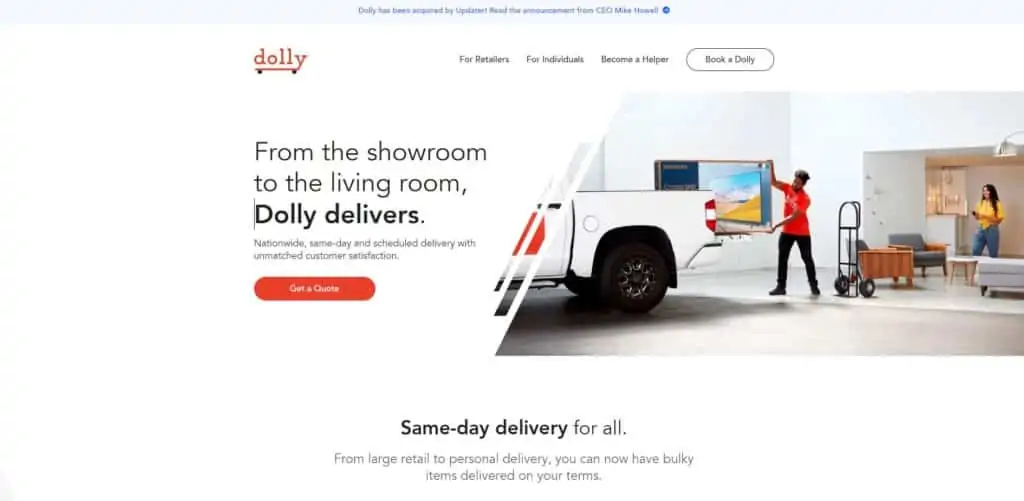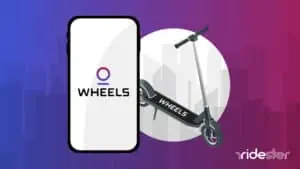Key Takeaways
- On-demand trucking offers real-time tracking, scalability, dynamic pricing, and detailed freight information.
- Uber Freight, Bungii, GoShare, Cargomatic, and Dolly provide varied truck-sharing services for different needs.
- Benefits include creating business opportunities, cost savings, flexibility, and reduced administrative burdens for users and drivers.
- Challenges include cargo size limitations, varying terms on damages, and preset costs not covering all inconveniences.
Features of On-Demand Truck Sharing Services
Although on-demand trucking evolved from regular ride-sharing apps, they’re quite different from getting an Uber pickup truck. This is because both these concepts have plenty of limitations that pickup truck apps address and improve.
Let’s start this guide by taking a quick look at how on-demand trucking dispatch services greatly add to the logistics business and transportation industry:
- Real-Time Tracking: It allows customers to track the location of their shipments in real-time, eliminating the guesswork. This also makes it easier for them to set ETAs for the shipment and plan accordingly.
- Scalability: More companies means better specialization. In other words, you can find freight rides to transport your cargo no matter the size.
- Dynamic Pricing: Like ride-share apps, these platforms also set a clear, dynamic pricing system. This makes it easier for truck owners and customers to negotiate and get the best possible rates.
- Includes Freight Detail: Unlike using Uber to move things, these platforms have better cargo coverage. This includes cargo size, cargo weight, etc.
List of Top On-Demand Truck-Sharing Companies
Logistics is one of the largest industries in the world, with a global market hitting $7.98 trillion in 2022 and an expected growth rate of 10.7% by 2030.
As a result, plenty of companies saw the opportunity to invest in on-demand truck sharing. In this section, we’ll take an in-depth look at some of the top companies and startups in this field and what they have to offer:
1. Uber Freight

As the name suggests, Uber Freight is a part of Uber Technologies Inc. However, the company is an autonomous business division, which means it has almost full control of how it operates.
The division was launched back in 2017 and has its headquarters in San Francisco, California. It also has a head office in Chicago.
Key Features and Services
Uber Freight builds heavily on the successful formula of the ride-share app. This includes connecting a large fleet of freight drivers and shippers with customers.
Like regular Uber, the system uses various algorithms and machine learning to estimate a fair quote for cargo transport. This allows users to book cargo freights even two weeks in advance.
Customer Service and Support
Besides instant quote comparison and hiring trustworthy carriers, Uber also stands out for its unmatched customer support.
Uber Freight offers a team of dedicated account managers available 24/7 to handle all technical inquiries for all kinds of shipments.
Pricing Model
Uber Freight uses the company’s deep experience in the ride-share field to create an advanced algorithm for real-time quote estimation.
Simply put, the system collects data on various factors and points that might affect the price. This also takes cargo details, booking patterns, and market conditions into account.
The system then crunches all these numbers and analyzes the data to generate a reasonable rate for each load.
2. Bungii

Bungii is one of the pioneer startups in the field of on-demand cargo delivery apps. The platform was launched back in 2015 in Kansas City but it has relatively limited coverage.
Today, the company has grown to operate in several major US cities, with many more to come in the following years.
Key Features and Services
Bungii offers a wide range of cargo delivery-rated features that make it stand out. These include last-mile delivery, real-time tracking, upfront pricing, and the ability to order trucks on demand or schedule the rides for later.
Additionally, Bungii has expanded its scope to cover a variety of services, including home delivery, anywhere delivery, reverse logistics, courier service, and more.
Customer Service and Support
Similar to Uber Freight, Bungii also has a dedicated customer support team available all year round and you can contact them at any time of the day.
Pricing Model
Bungii incorporated machine learning and API technologies into its business to make its pricing system seamless and reliable.
The company uses a simple (per mile + minute) system to calculate the estimated cost of a ride.
Yet, it also takes other factors into account, such as pickup location and booking patterns. Like Uber Freight, you always get an estimate before the delivery.

GoShare is a logistics technology platform designed to connect individuals and businesses with a wide variety of couriers.
The company was founded in 2014 and started its operations a year later. Today, the company’s headquarters is located in San Diego, California. It also operates in a wide range of cities with potential future expansions.
Key Features and Services
Although GoShare is fairly similar to how Bungii operates, it offers a wider range of courier options.
In addition to pickup trucks, the company also provides anything from small couriers to cargo vans and even box trucks.
The success of GoShare allowed the company to expand its partnerships to include various entities, including Tesla, Costco, Pepsi, Sherwin-Williams, and Cummins.
GoShare has a simple platform interface and offers free estimates of the ride before deliveries using AI. It also has specialized delivery services, such as help moving, hauling, delivery, etc.
Customer Service and Support
GoShare has a specialized customer support team to handle different inquiries and assist both customers and drivers. However, unlike Bungii, customer support is limited to certain times of the day.
According to the official website, you can contact GoShare support from 4 AM to 9 PM PST on weekdays and from 5 AM to 9 PM on weekends.
Pricing Model
GoShare has a straightforward approach when it comes to pricing. The company has a free price estimator on the official website.
This allows you to easily calculate how much a ride is going to cost you, although it can feel a bit tedious when you compare it to Bungii’s system.
4. Cargomatic
Cargomatic is one of the earliest platforms to enter the market of Uber for trucks, as it was launched in 2013.
The California-based logistics company connects customers with truck drivers through a large network to facilitate shipping and hauling.
Key Features and Services
Cargomatic has a convenient system that allows users to book and monitor freight shipments using real-time tracking.
The platform uses an advanced matching algorithm to connect shippers based on their routes and cargo capacities. This helps in wasting no space in cargo loads and reducing empty miles.
In other words, the company contributes to the gig economy by making truck drivers more accessible while also improving the overall efficiency of rides by maximizing loading capacity.
Customer Service and Support
Connecting with Cargomatic’s support team is relatively simple, as the company provides various methods of contact, including live calls and email.
However, some might find that a little inconvenient due to the lack of live chat options. That being said, the service is available 24/7, unlike GoShare.
Pricing Model
Cargomatic doesn’t have a flat rate fee for its services like the previously mentioned companies. Instead, it charges the couriers 20% of the fees they agree to with customers.
5. Dolly

Dolly is an app that specializes in moving help and furniture delivery. The company was established in 2015 in the Seattle Metropolitan Area.
The company has been growing and gaining large funding ever since, and today, it operates in 45 cities with plans for future expansions.
Key Features and Services
Dolly offers a wide range of helpful moving aid services ranging from store deliveries and house/business/storage moves to junk removal and donation runs.
Customer Service and Support
Dolly’s customer support team is quite friendly and helpful, but unfortunately, they’re not available 24/7. You can contact the team during working hours from 9 AM to 9 PM (ET) every day of the week.
Pricing Model
The app tries to keep the process simple and similar to how regular Uber works. This means that you get real-time tracking and upfront pricing before booking
Comparative Analysis
Most truck share platforms typically offer similar services and features, such as real-time tracking and upfront pricing. However, they vary when it comes to load specialization and main selling points.
For instance, Uber Freight’s highlight feature is having the largest network of carriers and shippers.
On the other hand, GoShare offers a variety of trucks ranging from pickups to box trucks. As for Dolly, its affordability makes it ideal for furniture hauls across town.
How to Choose the Right Truck-Sharing Service
The choice between the previous companies depends on several factors. These mainly include the type and size of cargo you want to transfer, as it also controls the truck size you will need.
For example, Uber Freight and Cargomatic are perfect for relatively large hauls, making them suitable for end-to-end enterprises and small businesses.
On the other hand, companies like Bungii, GoShare, and Dolly are better suited for smaller hauls. This makes them a simpler option if you need help moving or delivering a medium-sized item locally.
They’re also convenient for booking small shipments or if you’re only looking for a clear upfront price.
As a truck driver, choosing between them also depends on your time commitment, the size of your truck, and the kind of cargo you want to haul.
Advantages of Using Truck Sharing for Businesses and Independent Drivers
Here’s a quick look at some of the main benefits of using Uber for truck platforms for hauling and moving.
1. Creating More Business Opportunities
Truck sharing apps allow both truckers and customers to connect through a large network, which makes matchmaking much easier and more convenient.
2. Cost Saving
It’s usually much more affordable to book a truck through truck-sharing apps because these apps implement various methods to reduce costs.
These include maximizing the utilization of the truck’s cargo space and reducing empty miles by connecting customers and trucks based on their routes
3. Provides Flexibility for Users and Drivers
These platforms connect you to a huge network of freight companies and independent truck drivers.
This facilitates business and gives both parties the freedom to do business in whatever way they see fit.
4. Reduced Administrative Burdens
Since algorithms and machine learning do the vast majority of the work, matching customers with truckers becomes much easier with these apps.
Additionally, the system takes care of various other aspects like documentation, cost estimation, payment processing, and much more.
on-demand freight apps also feature knowledgeable and reliable customer support teams, which help keep the process smooth by answering inquiries by both customers and drivers.
Challenges and Considerations of Uber for Trucks Companies
Despite all their merits, on-demand truck-sharing services still have their challenges and downsides.
For example, there’s always a limitation to the size of cargo and type of shipment you want delivered.
Different companies also have their own terms and conditions regarding damages, so you have to keep that in mind.
Also, since most platforms set a pre-estimated cost for the delivery, it doesn’t account for any inconveniences or detours you need to take.
Wrapping Up
The transportation industry is going through one of its largest transformations in decades, and as you can see, there are several Uber for trucks platforms out there ready to become a part of this new landscape.
With all the options available out there, choosing the right one for your needs is quite essential, whether you’re a customer or a driver.
Luckily, the companies we mentioned above offer a wide range of services and features that suit a wide range of purposes, so you can use this guide to help you make the right decision.





